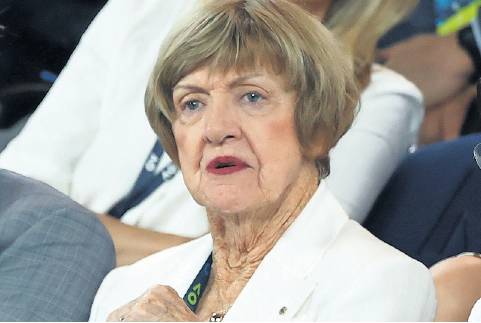Time to enhance, not diminish, our honours
MARGARET COURT
Like many, I was saddened by Margaret Court’s AC. Court has already received an Order of Australia award recognising her service. As with at least two of last year’s awards she is a controversial figure with loudly advocated extremist opinions, hurtful and socially damaging to many, and certain to provoke Australians who value diversity, tolerance and non-extreme views. Is the Council for the Order of Australia insensitive, or deliberately provocative?
Consider the council: Nineteen distinguished citizens, well gender-balanced, all with an indisputable record of service. Three are ex officio (defence forces, public service and government). Eight public servants represent the states. Seven are ‘‘community representatives’’, including board directors, a philanthropist, a couple from law and business, and a medical scientist.
They are without exception white, Anglo-European, with almost no discernible ethnic diversity. That raises questions about their shared capacity to make informed judgments about multicultural communities with which they are entirely unfamiliar.
As a recipient, I value the honour immensely. Please take care to enhance it, not demean and devalue it. John O’Toole, AM, Brisbane
Recognising an important health issue
Like Rodney Syme (Letters 25/1) I do not wish to be associated with an organisation that condones the views of Margaret Court by awarding her the greatest honour that can be given to an Australian. I have therefore written to the Governor-General returning my 2014 award as a member of the Order of Australia (AM) for ‘‘services to women’s reproductive healthcare, in particular that of Aboriginal and immigrant women’’.
This was an award I was honoured and humbled to receive, as I felt that my work in medical practice and in advocacy for women’s health services and healthcare rights was always very much part of a team effort. I also greatly appreciated the work put into the application for my award by the colleagues who nominated me.
However as a medical practitioner, and as the mother of a gay son, of whom I am immensely proud, I am particularly concerned for the mental and physical health of the LBGTQIA+ people who are Court’s repeated targets. This is an important health issue and one I feel I must make a stand on. Caroline de Costa, Carlton
Australia has moved on from bigoted 1960s
Scott Morrison, not Margaret Court, should be in the dock over the Australia Day award. In the era of Court’s sporting triumphs homophobia, transphobia and religious prerogative were on the national homepage, but those days are over. The storm over Australia’s highest honour being awarded to a bigoted sporting great would not have happened in the 1960s, but in 2021 we care about the effect of taking a swing at minorities.
The suggestion that emergency food relief for which Court’s church is responsible absolves her from the injury of her relentless promotion of faith-based discrimination to the mental health of LBGTQIA+ Australians is an absurd attempt in political accounting.
Claims of independence of national awards from political bias will not be swallowed.
Morrison has already promised conservative religious leaders legislative weapons to wage war on contemporary values in the form of religious freedom legislation that is still on the drawing board.
Court’s reliance on the authority of the Bible to denigrate those in the firing line of pre-enlightenment organisations is precisely why a modern Australian government should be defending its citizens instead of mandating such attacks through awarding medals minted at the expense of those likely to be facing prejudice.
Churches have limited credentials in the area of human rights, indeed biblical texts are often the anchors dragged behind the advancement of social justice, but this retro acknowledgement seems an attempt to throw the engine into reverse and the turbulence is in danger of sinking the government’s credibility.
Fr Peter MacLeod-Miller, Albury, NSW
